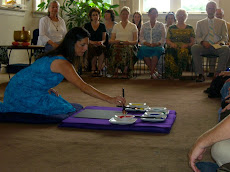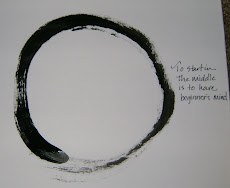Enjoy yourselves, keep your brain in your head and your head firmly attached to your body, the body active and alive...
Edward Abbey
Interestingly, life always seems to take me where I had no idea I wanted to go. Sometimes to uncomfortable places - even scary places - so I can learn something I needed to learn in a way I wouldn't have otherwise. Sometimes to places of incredible grace and joy - a place where I grow and stretch, play and celebrate. And sometimes I am taken to a place of relaxtion and contemplation - joyous in its own way, bittersweet in another, and, most definitely filled with "aha's," and "oh, yeses," and questions.
The last place is where I was the past two evenings: at Passover seders. I am blessed with the good fortune of having met and befriended thoughtful, loving, mirthful friends since I moved to Arizona almost two years ago. I am grateful that a few of them have been Jews, with whom I can share a seder table with.
I am not a religious Jew, but Passover has always been my favorite of the holidays. Perhaps it is because it holds such universal meaning and, within that, an underlying sense of gratitude and hope for a better life for all. Maybe it's also because of the tradition and ritual involved with the seder (which means "order" or "sequence") and the retelling of story that makes me feel connected to my Jewish ancestors and entrusted with a sense of "tikkun olam" - a responsibility to do my part in healing the world. And it also may be that I like this holiday so much because it asks that we ask - that we seek, that we wonder, that we dig a little bit deeper...into our selves and who we are in this world: what our purpose is, and why this night - this Passover night - is different from any other night.
Auspicious...serendipitous...call it what you will - but I find it fascinating that I spent two evenings practicing a time-honored ritual that I have partaken in since childhood, whilst in the middle of my thesis...about ritual! That I took time out from my crazy schedule to just sit, just be, and be a part of something bigger than me, and yet something that connects my past and present, connects me to others, and connects me to the greater world.
I wrote about the "Passover questions" in my paper last week, in trying to get at the essence of what makes something a ritual, "How is this activity different from any other activity? Why is it different and set apart? What is it this activity does that no other activity can do?" The problem was, my thesis advisor said this evening, is I haven't answered them. Aha! And that's why we have thesis advisors: to point us in the direction of asking ourselves more questions...and attempting to answer them...or at least, to go forth and seek the answers...and probably run into some more questions.
Funny, too, that I was thinking this afternoon how nice it was to take time out from my schedule to be fully present at these two special dinners - and my thesis advisor pointed out that what I need in my thesis is a bit more Buddha energy - more space energy - within the paper itself. Like my life, my thesis is cluttered. Lots of good thoughts and ideas, my advisor said, just so many that the essence of the sacred is lost in the busy-ness.
Another co-inky-dink: Before my morning meditation on Sunday, I read the following Zen parable:
A man walking across a field encountered a tiger. He fled, the tiger chasing after him. Coming to a cliff, he caught hold of a wild vine and swung himself over the edge. The tiger sniffed at him from above. Terrified, the man looked down to where, far below, another tiger had come, waiting to eat him. Two mice, one white, one black, little by little began to gnaw away at the vine. The man saw a luscious strawberry near him. Grasping the vine with one hand, he plucked the strawberry with the other. How sweet it tasted!
This story is about letting go of attachment and being present for everything; acknowledging that the sweetness comes with the challenges and difficulties. That all of life is in just one moment.
I read the parable in Pema Chodron's book, Uncomfortable with Uncertainty. My friend, Miles, who created his own Haggadah (special book we read at the Passover dinner), put that very same parable in the book on Sunday for Monday's seder.
That is one big Dayenu ("it would have been enough") right there!
Lizard Coloring Page
2 years ago




